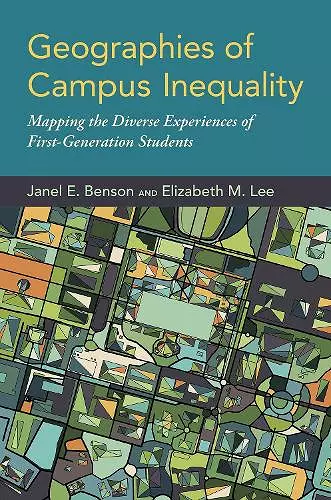Geographies of Campus Inequality
Mapping the Diverse Experiences of First-Generation Students
Elizabeth M Lee author Janel E Benson author
Format:Hardback
Publisher:Oxford University Press Inc
Published:22nd Sep '20
Should be back in stock very soon

In efforts to improve equity, selective college campuses are increasingly focused on recruiting and retaining first-generation students-those whose parents have not graduated from college. In Geographies of Campus Inequality, sociologists Benson and Lee argue that these approaches may fall short if they fail to consider the complex ways first-generation status intersects with race, ethnicity, and gender. Drawing on interview and survey data from selective campuses, the authors show that first-generation students do not share a universal experience. Rather, first-generation students occupy one of four disparate geographies on campus within which they negotiate academic responsibilities, build relationships, engage in campus life, and develop post-college aspirations. Importantly, the authors demonstrate how geographies are shaped by organizational practices and campus constructions of class, race, and gender. Geographies of Campus Inequality expands the understanding of first-generation students' campus lives and opportunities for mobility by showing there is more than one way to be first-generation.
Geographies of Campus Inequality is another great example of empirical work that needs to be taken seriously if selective colleges really want to better meet the needs of a diverse group of first-generation college students. * Laura Nichols, Santa Clara University, The American Journal of Sociology *
This book shines when it demonstrates that "first-generation status is an intersectional category, more or less meaningful for individual students, and intertwined with other identities such as race, gender, and income" (p. 173). We see that without accounting for intersecting identities, the FG [First Generation] category could end up accounting for no students' experiences or outcomes. The observation that organizational structures shape the possibilities for how students will perceive and navigate college is an important one. That is, what it means to be FG, in terms of experiences, perceptions, and outcomes, comes not only from the students themselves, but also is "based on the available social world, the dominant social structure, and the ways in which they have been invited into campus with particular opportunities and resources" (p. 169). * Tina Wildhagen, Smith College, Contemporary Sociology *
Overall, Geographies of Campus Inequality is an excellent resource reviewing the intersections of first-generation students' identities, backgrounds, and experiences, particularly within the lesser-reviewed area of selective-admission institutions. While this work focuses on selective institutions, there remains broad applicability to other types of institutions of higher education as well. The "geographies" construct is very useful in making sense of the diversity within the first-generation cohort. The care that Benson and Lee take to approach first-generation experiences from an institution-first perspective instead of a student-deficit-oriented perspective is refreshing, providing realistic and concrete recommendations that institutions may consider in their recruitment and education of first-generation and low-income students. * Teachers College Record *
... this thoroughgoing analysis should be of considerable value to college counseling personnel hoping to better serve their resident students and promote more enhanced adjustments at their colleges. * W. Feigelman, emeritus, Nassau Community College, CHOICE *
ISBN: 9780190848156
Dimensions: 236mm x 155mm x 23mm
Weight: 454g
216 pages